人教版九年级下册 Unit8 It must belong to Carla. SectionB 2a-2d 课件(共31张PPT,无音频)
文档属性
| 名称 | 人教版九年级下册 Unit8 It must belong to Carla. SectionB 2a-2d 课件(共31张PPT,无音频) | 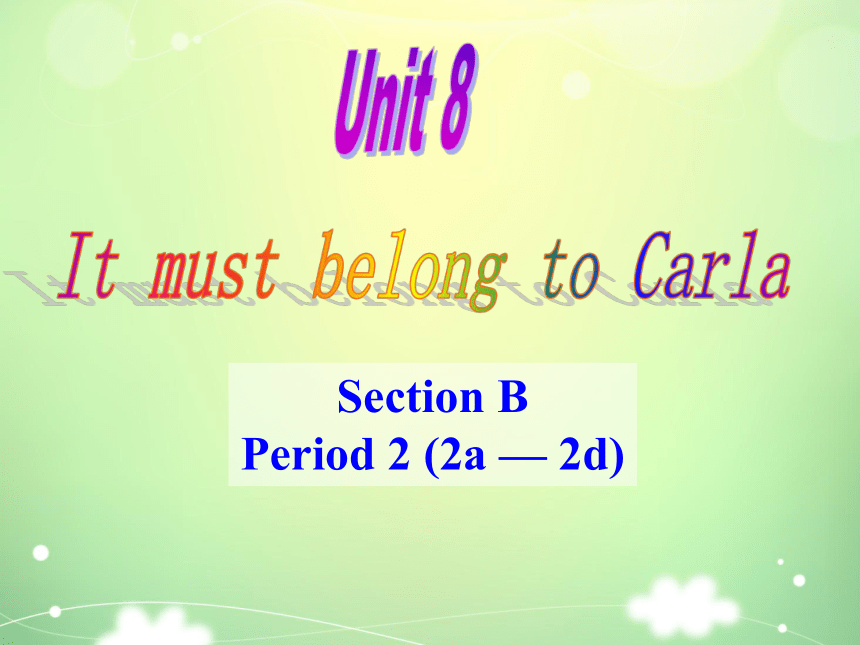 | |
| 格式 | ppt | ||
| 文件大小 | 1.7MB | ||
| 资源类型 | 教案 | ||
| 版本资源 | 人教新目标(Go for it)版 | ||
| 科目 | 英语 | ||
| 更新时间 | 2023-03-17 20:53:29 | ||
图片预览

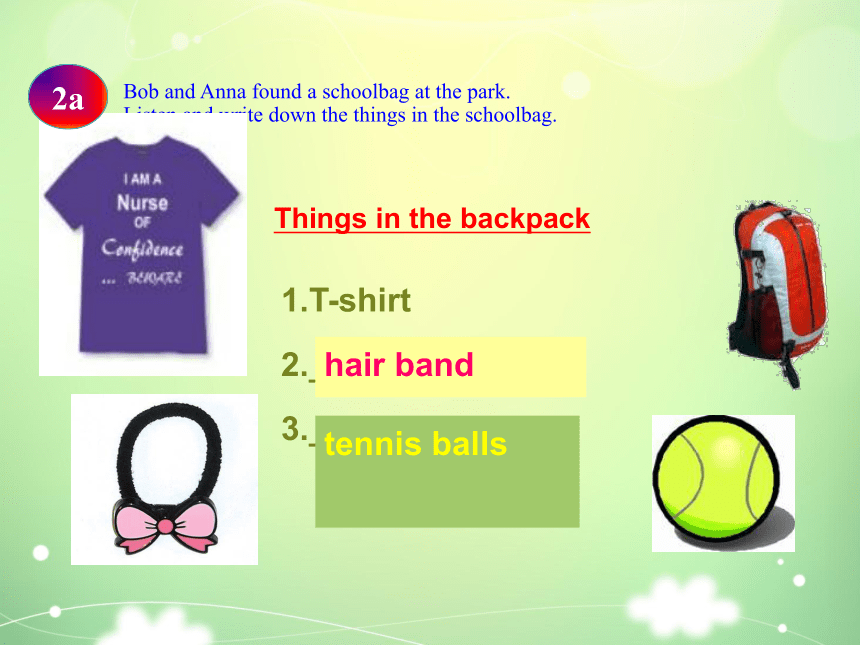
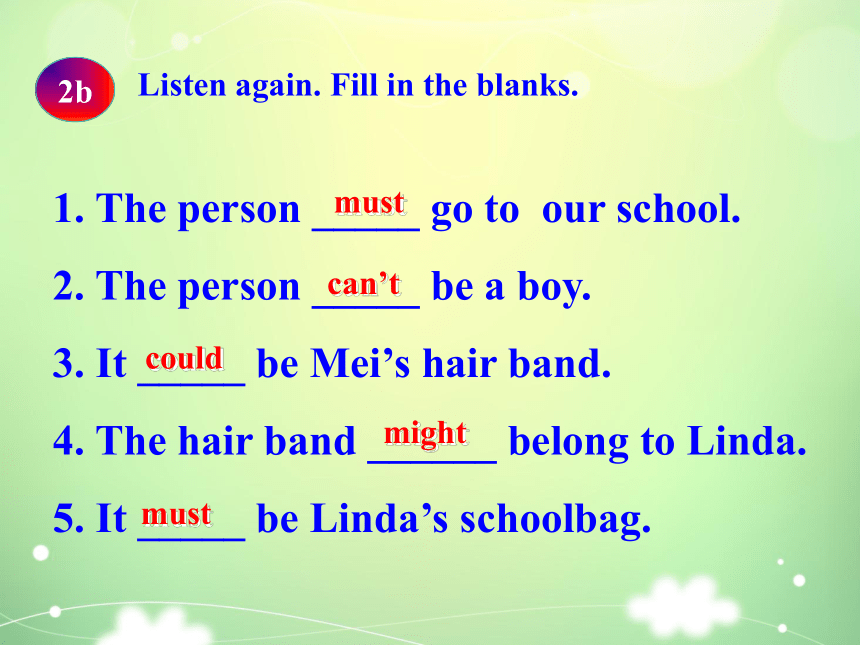

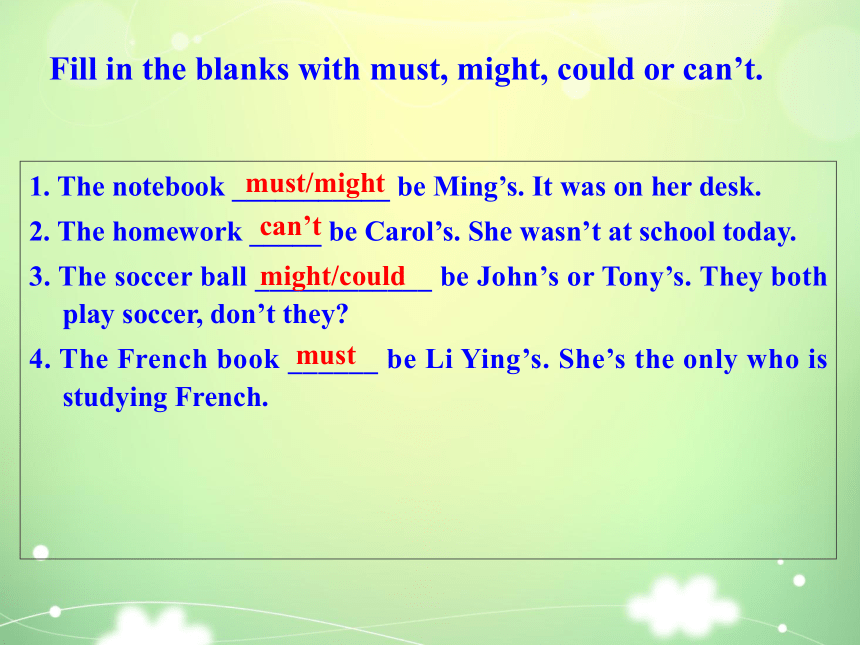
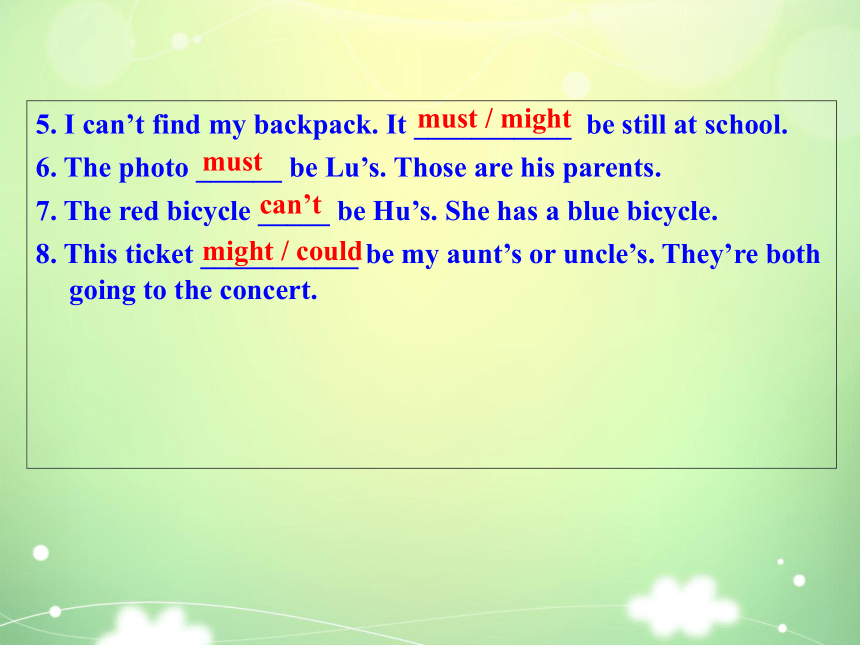
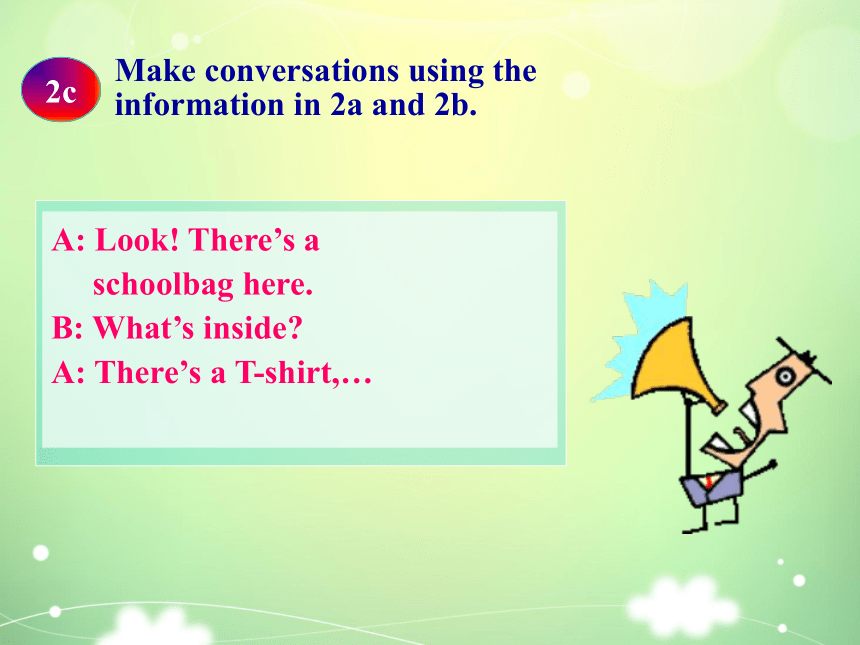
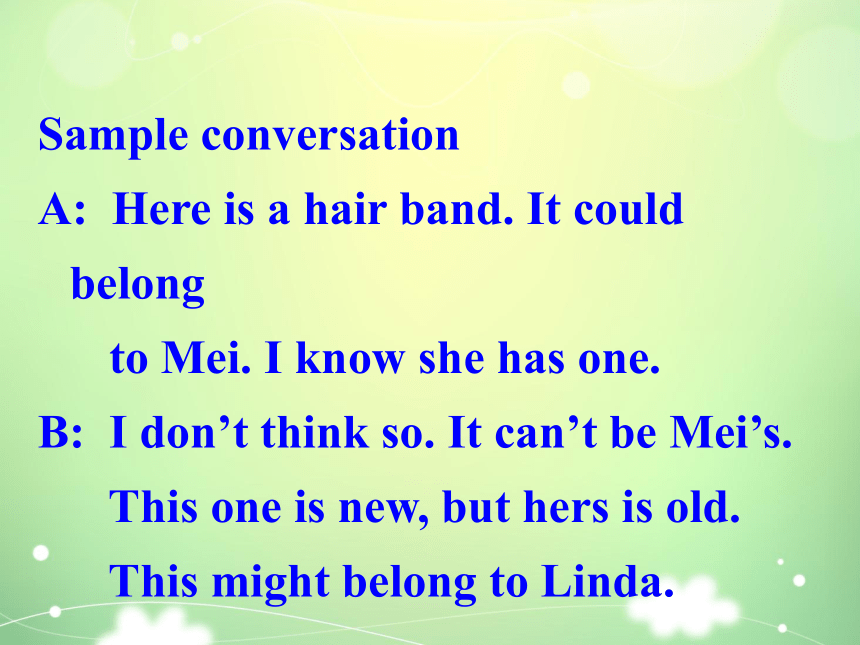
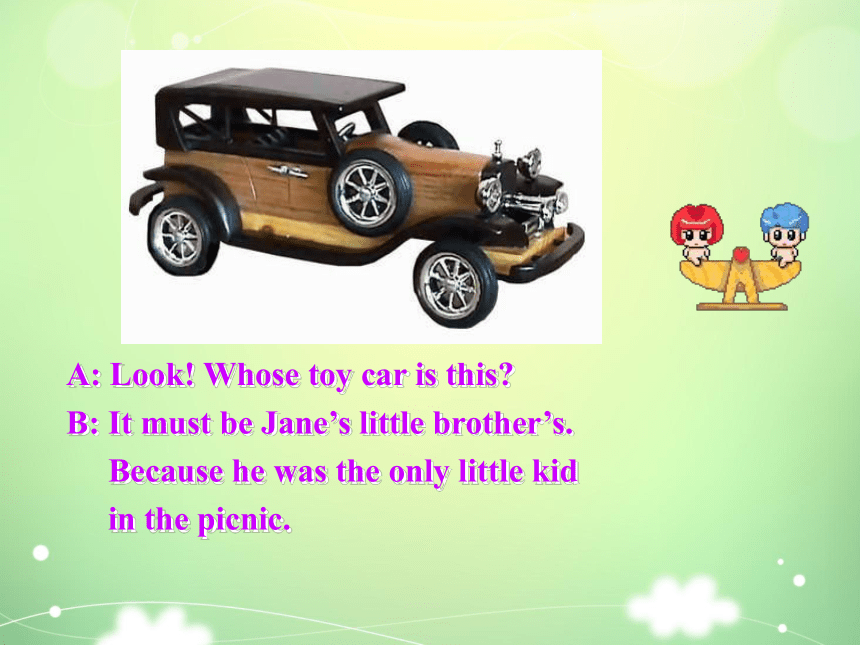
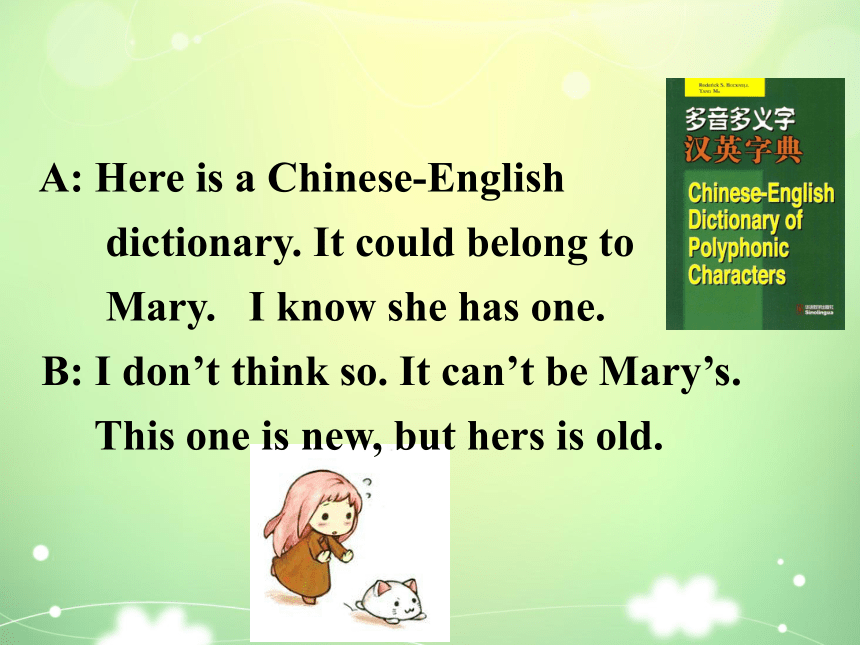
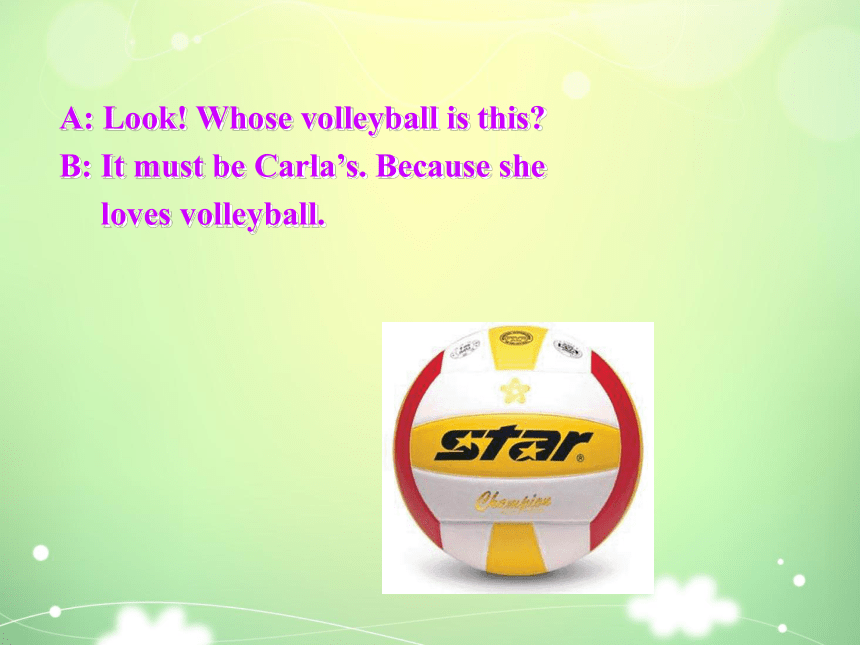
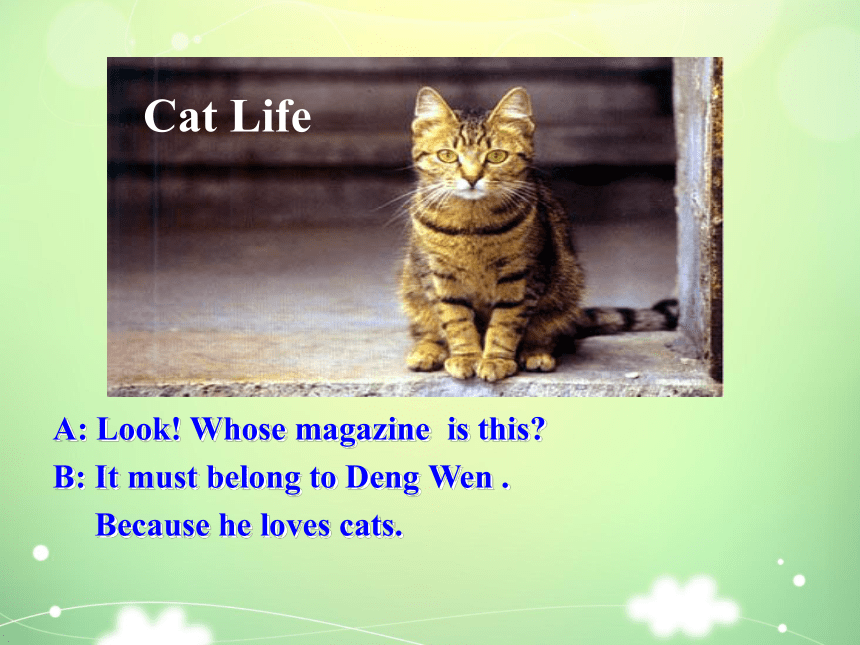
文档简介
(共31张PPT)
Section B
Period 2 (2a — 2d)
Bob and Anna found a schoolbag at the park.
Listen and write down the things in the schoolbag.
Things in the backpack
1.T-shirt
2.___________
3.___________
hair band
tennis balls
2a
1. The person _____ go to our school.
2. The person _____ be a boy.
3. It _____ be Mei’s hair band.
4. The hair band ______ belong to Linda.
5. It _____ be Linda’s schoolbag.
must
can’t
could
might
must
Listen again. Fill in the blanks.
2b
Use “must” to show that you think something
is probably true.
Use “might” or “could” to show that you
think something is possibly true.
Use “can’t” to show that you’re almost sure
something is not true.
Fill in the blanks with must, might, could or can’t.
1. The notebook ___________ be Ming’s. It was on her desk.
2. The homework _____ be Carol’s. She wasn’t at school today.
3. The soccer ball ____________ be John’s or Tony’s. They both play soccer, don’t they
4. The French book ______ be Li Ying’s. She’s the only who is studying French.
must/might
must
might/could
can’t
5. I can’t find my backpack. It ___________ be still at school.
6. The photo ______ be Lu’s. Those are his parents.
7. The red bicycle _____ be Hu’s. She has a blue bicycle.
8. This ticket ___________ be my aunt’s or uncle’s. They’re both going to the concert.
must / might
must
can’t
might / could
A: Look! There’s a
schoolbag here.
B: What’s inside
A: There’s a T-shirt,…
Make conversations using the
information in 2a and 2b.
2c
Sample conversation
A: Here is a hair band. It could belong
to Mei. I know she has one.
B: I don’t think so. It can’t be Mei’s.
This one is new, but hers is old.
This might belong to Linda.
A: Look! Whose toy car is this
B: It must be Jane’s little brother’s.
Because he was the only little kid
in the picnic.
A: Here is a Chinese-English
dictionary. It could belong to
Mary. I know she has one.
B: I don’t think so. It can’t be Mary’s.
This one is new, but hers is old.
A: Look! Whose volleyball is this
B: It must be Carla’s. Because she
loves volleyball.
A: Look! Whose magazine is this
B: It must belong to Deng Wen .
Because he loves cats.
Cat Life
2d
Make a conversation, using 2d as a model.
Where is my cell phone
Make a conversation, using 2d as a model.
Where is my ear phone
1. belong to 属于
The guitar might belong to Alice.
这把吉他也许是爱丽丝的。
China belongs to the third world.
中国属于第三世界。
Language points
The car belongs to my uncle.
这句话还可以说:The car is my uncle’s. 当表述某物属于某人时,注意这两句的不同。 belong to后直接加人名或人称代词宾格,而第二句be动词后要用名词所有格形式或名词性物主代词。
The book belongs to me.
= The book is mine.
The T-shirt belongs to Tom.
= The T-shirt is Tom’s.
知识链接
2. Whose book is this
whose adj. 谁的
No one knows whose dictionary this is.
无人知道这是谁的字典。
Whose sweaters are these
这些是谁的毛衣?
whose 用来对物主代词及名词所有格提问:
1).提问形容词性的物主代词。
These are my bananas.
→ Whose bananas are these
2).提问名词性的物主代词。
That bedroom is mine.
→ Whose is that bedroom
Hers are in the classroom.
→ Whose are in the classroom
知识链接
3).提问名词所有格(不包括of构成的所有格)
Those are the twins’ bags.
→ Whose bags are those
Tom’s mother is a good teacher.
→ Whose mother is a good teacher
4). whose 可针对 my、your、our、their、
Kate’ 等形容词性物主代词提问
3. attend a concert
attend v. 出席;参加
Children must attend school.
儿童必须上学。
I promised to attend the show.
我答应去观看文艺演出。
They were sent to the hospital to attend
short-term training courses.
他们被派到医院去参加短训班。
attend, join, join in, take part in都有“参加”的意思。区别是:
attend主要指“到场”或“出席”会议、宴会、典礼、仪式等。
join指参加某团体或组织成为其中一员或参加活动,是非正式用语。
join in表示“加入;参加(某种活动)”,in之后接名词或v.-ing形式;表示“参加某人的某种活动”时,可用join sb. in (doing) sth. 。
take part in指参加一项工作, 在其中分担一部分, 也指参加活动并积极工作。
知识链接
My mother attended an important meeting yesterday.
We are going swimming. Would you like to join us
Will you join us in playing basketball
I'm going to take part in the sports meeting.
4. Do you something valuable in your schoolbag
valuable adj. 很有用的;宝贵的
This painting is very valuable.
这幅绘画非常名贵。
He gave us valuable advice on the problems of
education.
他在教育问题上给我们提了宝贵的建议。
This experience is valuable to me.
这一经历对我很有用。
value n. 价值;价格;重要性
5. I think somebody must have picked it up.
must have picked it up是“must + have + 过去分词”的结构,表示对过去时间里可能发生的事情的推测,语气较强,具有“肯定”的意思。
--- Linda has gone to work, but her bicycle
is still here.
--- She must have gone by bus.
情态动词+have+过去分词
may (might) have + done sth. / can (could) have + done sth., 表示过去,推测过去时间里可能发生的事情。
ought to have done sth., should have done sth. 本应该做某事,而事实上并没有做。否定句表示"不该做某事而做了"。
You ought to (should) have been more careful in this experiment.
ought to 在语气上比should 要强。
知识链接
3) needn't have done sth. 本没必要做某事
I dressed very warmly for the trip, but I
needn't have done so. The weather was hot.
4) would like to have done sth. 本打算做某事
I would like to have read the article, but I was
very busy then.
情态动词 must, might, could, can’t 后接动词原形, 可以表示对现在的情况的 .
It can’t ( )…
It might/could ( ) …
It must ( ) …
+ be (cold/a CD/ sb’s)
★
★
It must
推测
不可能
有可能
肯定
belong to sb. (属于…)
及时小结才能巩固所学知识
be sb’s (是…的)
Summary
羊村失物招领处发现一个书包,如图,引发了大家的猜测,运用今天学习的知识(must, could, might, can’t, belong to等),写一篇英文对话,猜猜书包是谁的,字数50左右
__________________________________________________________________________________________________________________________________________________________________________________________________________________
baseball glove
(棒球手套)
A: Whose backpack is this
B: Look! Here are some earrings. The owner can’t be a boy.
A: Well, it could be a boy. The earrings might be a present for his mother.
Section B
Period 2 (2a — 2d)
Bob and Anna found a schoolbag at the park.
Listen and write down the things in the schoolbag.
Things in the backpack
1.T-shirt
2.___________
3.___________
hair band
tennis balls
2a
1. The person _____ go to our school.
2. The person _____ be a boy.
3. It _____ be Mei’s hair band.
4. The hair band ______ belong to Linda.
5. It _____ be Linda’s schoolbag.
must
can’t
could
might
must
Listen again. Fill in the blanks.
2b
Use “must” to show that you think something
is probably true.
Use “might” or “could” to show that you
think something is possibly true.
Use “can’t” to show that you’re almost sure
something is not true.
Fill in the blanks with must, might, could or can’t.
1. The notebook ___________ be Ming’s. It was on her desk.
2. The homework _____ be Carol’s. She wasn’t at school today.
3. The soccer ball ____________ be John’s or Tony’s. They both play soccer, don’t they
4. The French book ______ be Li Ying’s. She’s the only who is studying French.
must/might
must
might/could
can’t
5. I can’t find my backpack. It ___________ be still at school.
6. The photo ______ be Lu’s. Those are his parents.
7. The red bicycle _____ be Hu’s. She has a blue bicycle.
8. This ticket ___________ be my aunt’s or uncle’s. They’re both going to the concert.
must / might
must
can’t
might / could
A: Look! There’s a
schoolbag here.
B: What’s inside
A: There’s a T-shirt,…
Make conversations using the
information in 2a and 2b.
2c
Sample conversation
A: Here is a hair band. It could belong
to Mei. I know she has one.
B: I don’t think so. It can’t be Mei’s.
This one is new, but hers is old.
This might belong to Linda.
A: Look! Whose toy car is this
B: It must be Jane’s little brother’s.
Because he was the only little kid
in the picnic.
A: Here is a Chinese-English
dictionary. It could belong to
Mary. I know she has one.
B: I don’t think so. It can’t be Mary’s.
This one is new, but hers is old.
A: Look! Whose volleyball is this
B: It must be Carla’s. Because she
loves volleyball.
A: Look! Whose magazine is this
B: It must belong to Deng Wen .
Because he loves cats.
Cat Life
2d
Make a conversation, using 2d as a model.
Where is my cell phone
Make a conversation, using 2d as a model.
Where is my ear phone
1. belong to 属于
The guitar might belong to Alice.
这把吉他也许是爱丽丝的。
China belongs to the third world.
中国属于第三世界。
Language points
The car belongs to my uncle.
这句话还可以说:The car is my uncle’s. 当表述某物属于某人时,注意这两句的不同。 belong to后直接加人名或人称代词宾格,而第二句be动词后要用名词所有格形式或名词性物主代词。
The book belongs to me.
= The book is mine.
The T-shirt belongs to Tom.
= The T-shirt is Tom’s.
知识链接
2. Whose book is this
whose adj. 谁的
No one knows whose dictionary this is.
无人知道这是谁的字典。
Whose sweaters are these
这些是谁的毛衣?
whose 用来对物主代词及名词所有格提问:
1).提问形容词性的物主代词。
These are my bananas.
→ Whose bananas are these
2).提问名词性的物主代词。
That bedroom is mine.
→ Whose is that bedroom
Hers are in the classroom.
→ Whose are in the classroom
知识链接
3).提问名词所有格(不包括of构成的所有格)
Those are the twins’ bags.
→ Whose bags are those
Tom’s mother is a good teacher.
→ Whose mother is a good teacher
4). whose 可针对 my、your、our、their、
Kate’ 等形容词性物主代词提问
3. attend a concert
attend v. 出席;参加
Children must attend school.
儿童必须上学。
I promised to attend the show.
我答应去观看文艺演出。
They were sent to the hospital to attend
short-term training courses.
他们被派到医院去参加短训班。
attend, join, join in, take part in都有“参加”的意思。区别是:
attend主要指“到场”或“出席”会议、宴会、典礼、仪式等。
join指参加某团体或组织成为其中一员或参加活动,是非正式用语。
join in表示“加入;参加(某种活动)”,in之后接名词或v.-ing形式;表示“参加某人的某种活动”时,可用join sb. in (doing) sth. 。
take part in指参加一项工作, 在其中分担一部分, 也指参加活动并积极工作。
知识链接
My mother attended an important meeting yesterday.
We are going swimming. Would you like to join us
Will you join us in playing basketball
I'm going to take part in the sports meeting.
4. Do you something valuable in your schoolbag
valuable adj. 很有用的;宝贵的
This painting is very valuable.
这幅绘画非常名贵。
He gave us valuable advice on the problems of
education.
他在教育问题上给我们提了宝贵的建议。
This experience is valuable to me.
这一经历对我很有用。
value n. 价值;价格;重要性
5. I think somebody must have picked it up.
must have picked it up是“must + have + 过去分词”的结构,表示对过去时间里可能发生的事情的推测,语气较强,具有“肯定”的意思。
--- Linda has gone to work, but her bicycle
is still here.
--- She must have gone by bus.
情态动词+have+过去分词
may (might) have + done sth. / can (could) have + done sth., 表示过去,推测过去时间里可能发生的事情。
ought to have done sth., should have done sth. 本应该做某事,而事实上并没有做。否定句表示"不该做某事而做了"。
You ought to (should) have been more careful in this experiment.
ought to 在语气上比should 要强。
知识链接
3) needn't have done sth. 本没必要做某事
I dressed very warmly for the trip, but I
needn't have done so. The weather was hot.
4) would like to have done sth. 本打算做某事
I would like to have read the article, but I was
very busy then.
情态动词 must, might, could, can’t 后接动词原形, 可以表示对现在的情况的 .
It can’t ( )…
It might/could ( ) …
It must ( ) …
+ be (cold/a CD/ sb’s)
★
★
It must
推测
不可能
有可能
肯定
belong to sb. (属于…)
及时小结才能巩固所学知识
be sb’s (是…的)
Summary
羊村失物招领处发现一个书包,如图,引发了大家的猜测,运用今天学习的知识(must, could, might, can’t, belong to等),写一篇英文对话,猜猜书包是谁的,字数50左右
__________________________________________________________________________________________________________________________________________________________________________________________________________________
baseball glove
(棒球手套)
A: Whose backpack is this
B: Look! Here are some earrings. The owner can’t be a boy.
A: Well, it could be a boy. The earrings might be a present for his mother.
同课章节目录
- Unit 1 How can we become good learners.
- Section A
- Section B
- Unit 2 I think that mooncakes are delicious!
- Section A
- Section B
- Unit 3 Could you please tell me where the restroom
- Section A
- Section B
- Unit 4 I used to be afraid of the dark.
- Section A
- Section B
- Unit 5 What are the shirts made of?
- Section A
- Section B
- Review of Units 1-5
- Unit 6 When was it invented?
- Section A
- Section B
- Unit 7 Teenagers should be allowed to choose their
- Section A
- Section B
- Unit 8 It must belong to Carla.
- Section A
- Section B
- Unit 9 I like music that I can dance to.
- Section A
- Section B
- Unit 10 You're supposed to shake hands.
- Section A
- Section B
- Review of Units 6-10
- Unit 11 Sad movies make me cry.
- Section A
- Section B
- Unit 12 Life is full of the unexpected
- Section A
- Section B
- Unit 13 We're trying to save the earth!
- Section A
- Section B
- Unit 14 I remember meeting all of you in Grade 7.
- Section A
- Section B
- Review of Units 11-14
